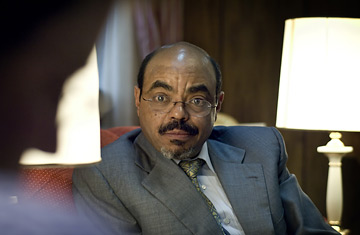
Prime Minister Meles Zenawi of Ethiopia in his office in the capital Addis Ababa.
(3 of 3)
TIME: African leaders often prove reluctant to leave office, but you've been hinting that you may not stand again?
Meles: I have three more years to go.
TIME: And then you will step down?
Meles: And then the process will kick in.
TIME: Why would you stand aside?
Meles: I have been around for quite a long time. Time to start thinking about doing new things.
TIME: Won't you leave a bit of a vacuum?
Meles: No. Politics here is not personality based. It is ideologically driven and organization based. That's part of its strength. In our case with the Ethiopian People's Revolutionary Democracy Front (E.P.R.D.F.) it's a movement with very well articulated positions. And these things do not change because of personalities. I have been in the minority position when issues of war and peace were at stake. And I have found myself implementing a majority position that I completely and utterly disagree with.
TIME: Such as?
Meles: Such as the war with Eritrea. There were a number of instances where I found myself in a minority and implementing decisions that I was uncomfortable with.
TIME: You have acquired the reputation as an abrasive leader and author of a confrontational foreign policy. Do you disagree with that view?
Meles: I probably fail to beat about the bush. But I would suggest that when and where I have been direct, I have tried to be respectful. In policy we have not been confrontational. We have always sought the peaceful way out, even when we are on the receiving end of aggression. With Eritrea, it was very obvious that Eritrea invaded our country. And we sought a peaceful way out. The Americans and the Rwandans came up with a peaceful option. We accepted that. The Eritreans did not. At some stage I felt we could have gone a bit further in terms of being accommodative. But we were never aggressive, whether in Somalia or Eritrea. Sometimes, when we disagree, we say so with perhaps a little extra force in it. That might be misunderstood.
TIME: What keeps you awake at night?
Meles: It has always been fear — fear that this great nation, which was great 1,000 years ago but then embarked on a downward spiral for 1,000 years, and reached its nadir when millions of people were starving and dying, may be on the verge of total collapse. Now it's not a fear of collapse, I believe we are beyond that. It's the fear that the light which is beginning to flicker, the light of a renewal, an Ethiopian renaissance, that this light might be dimmed by some bloody mistake by someone, somewhere. This [renaissance] is still fragile, a few shoots [which] may need time to be more robust. At the moment, it is fear born out of hope that this new millennium will be as good as the first one and not as bad as the second one.
